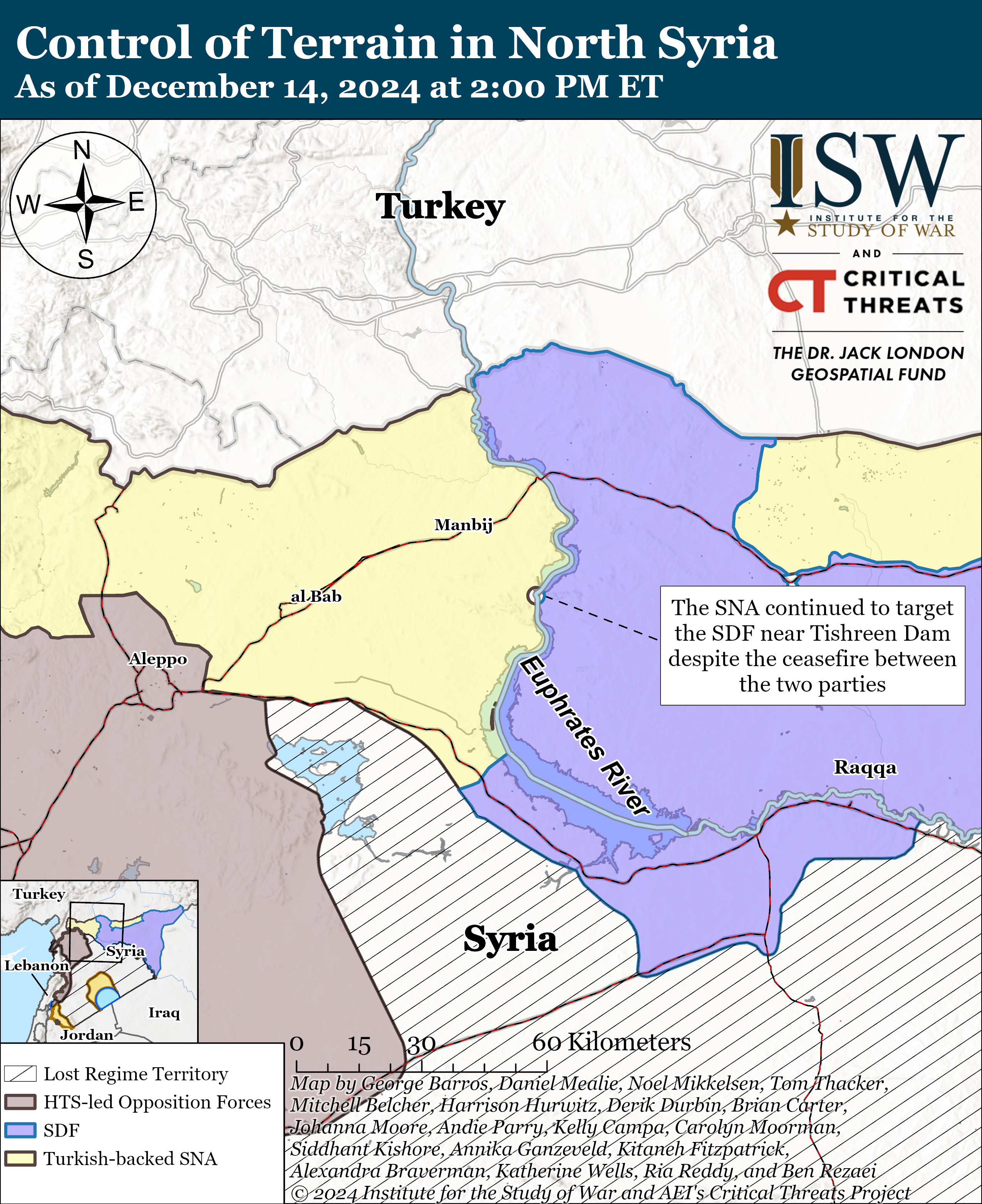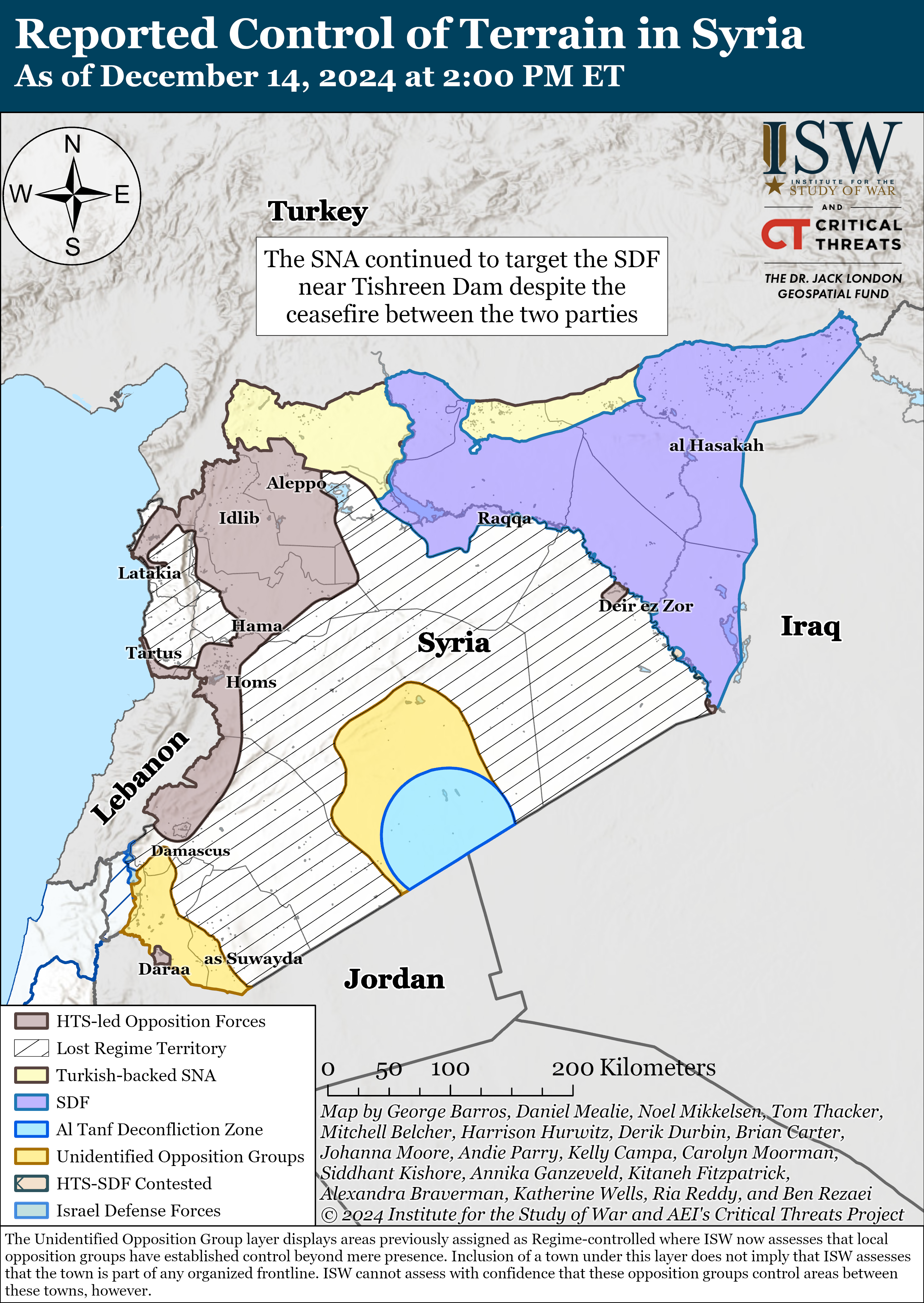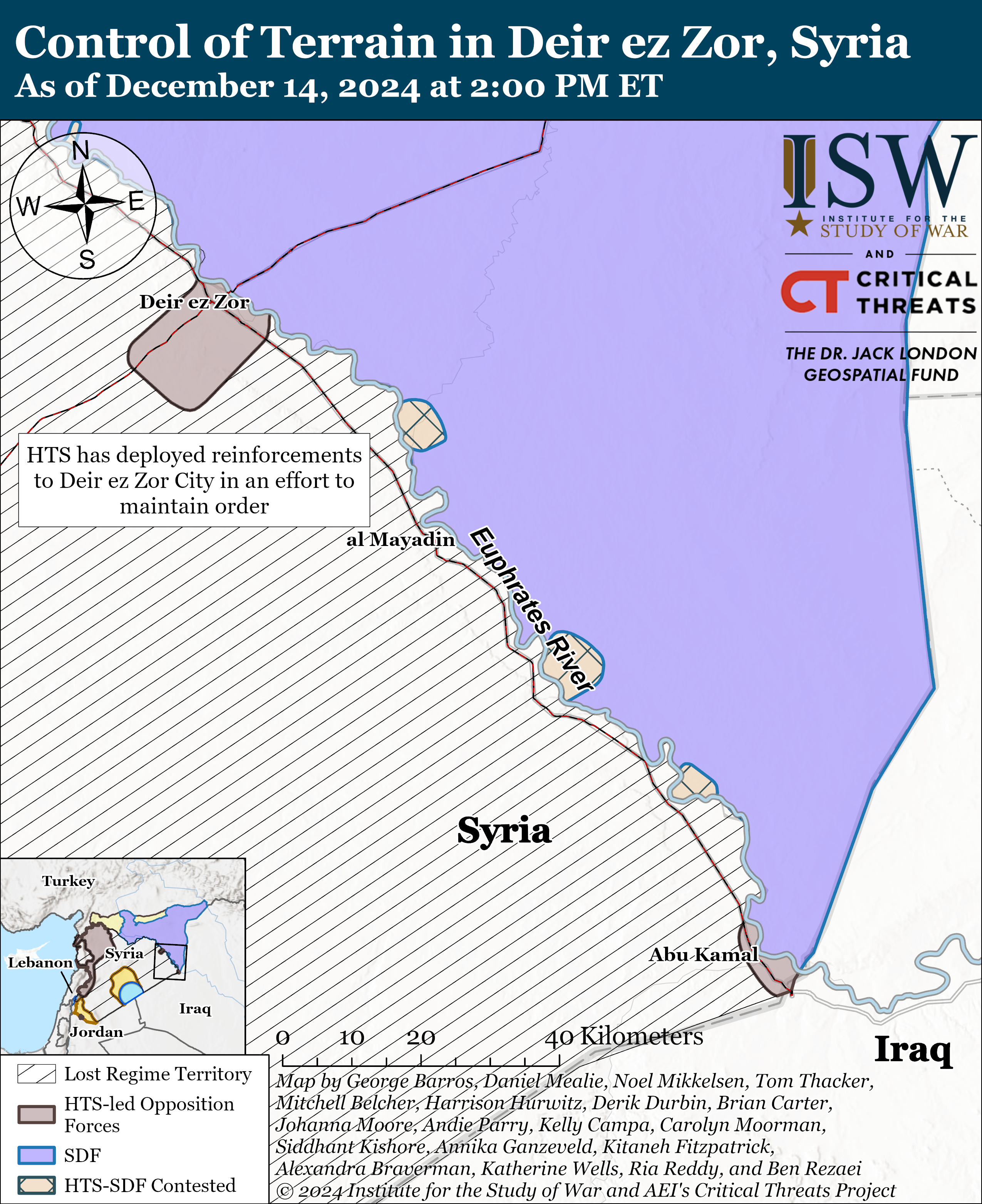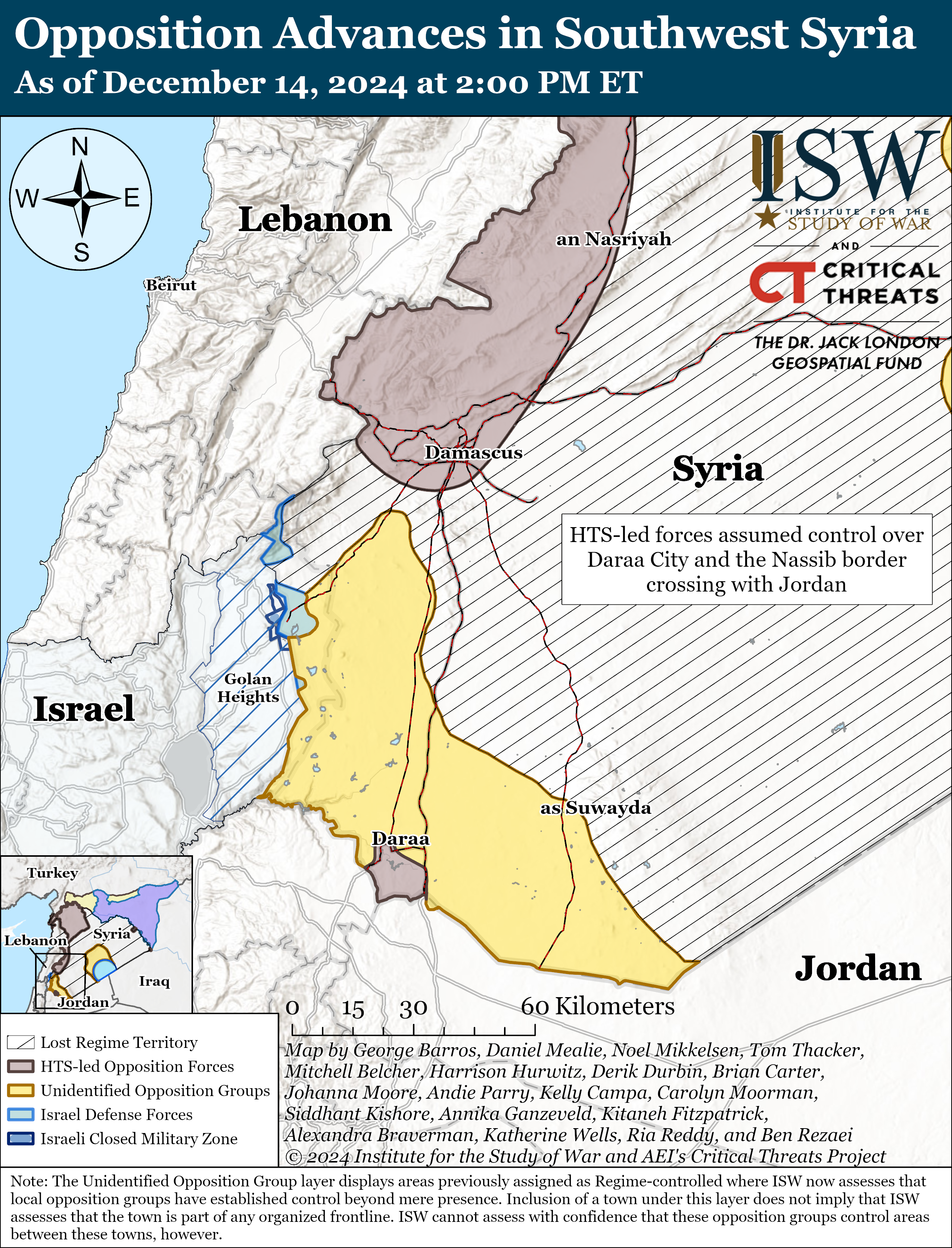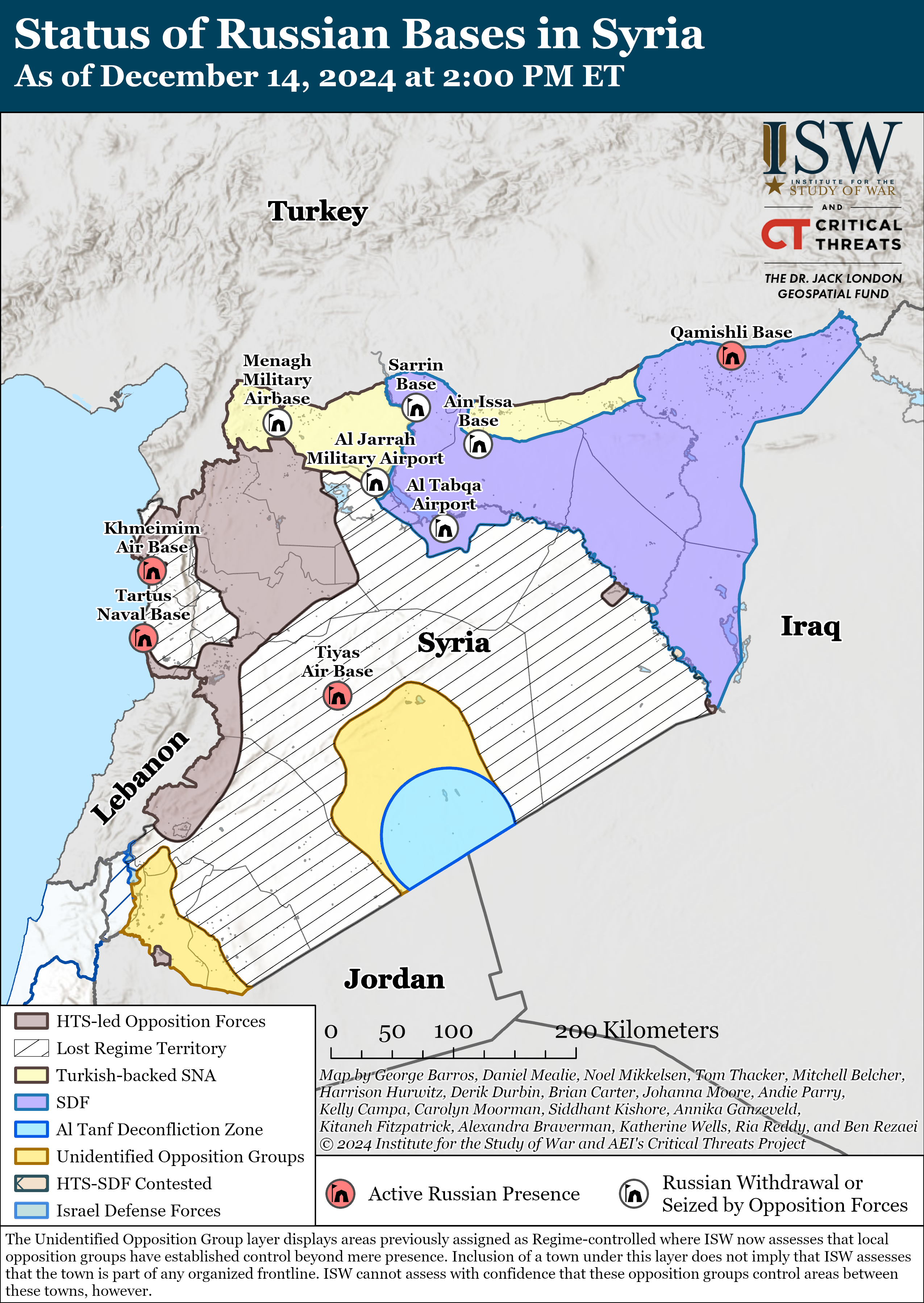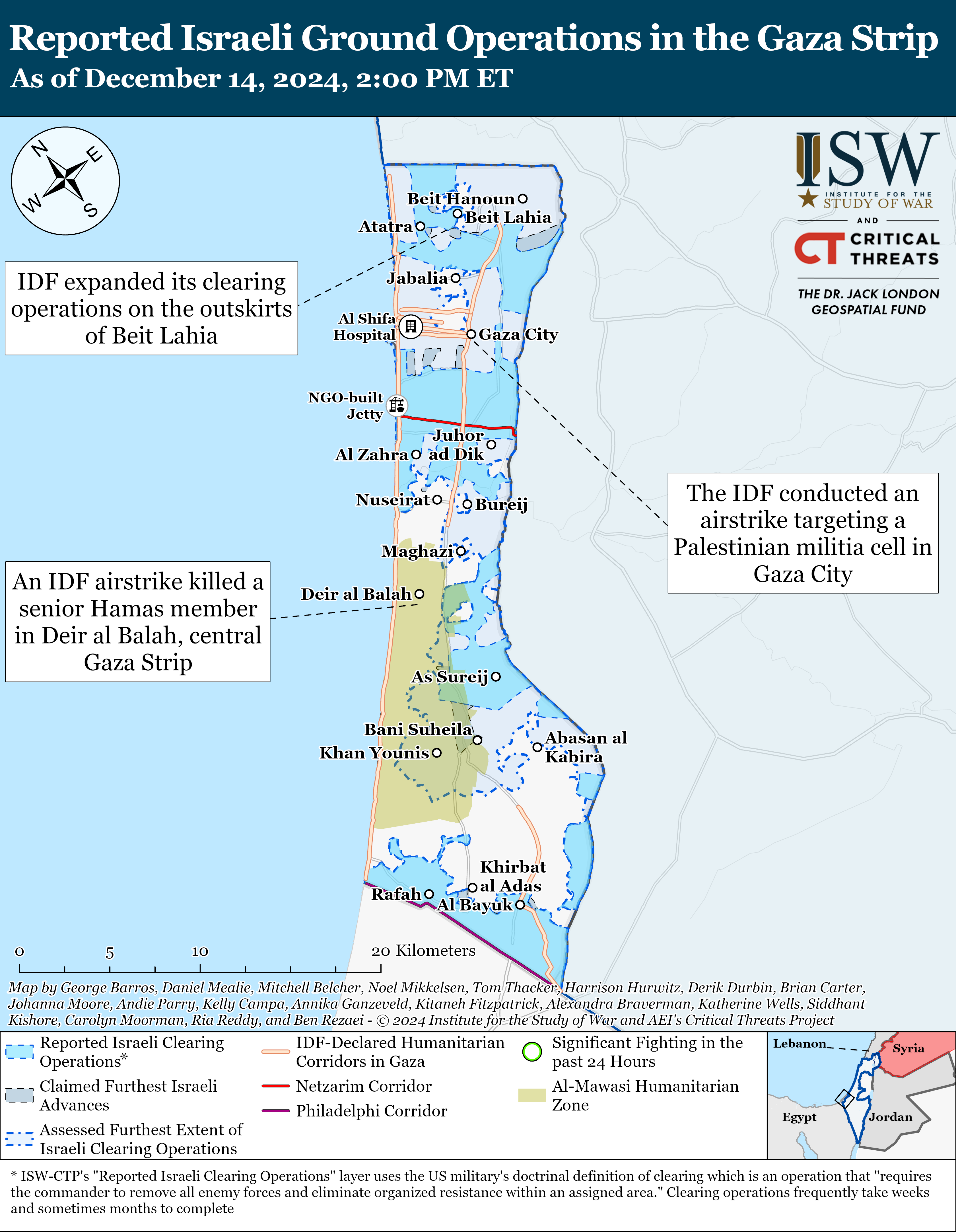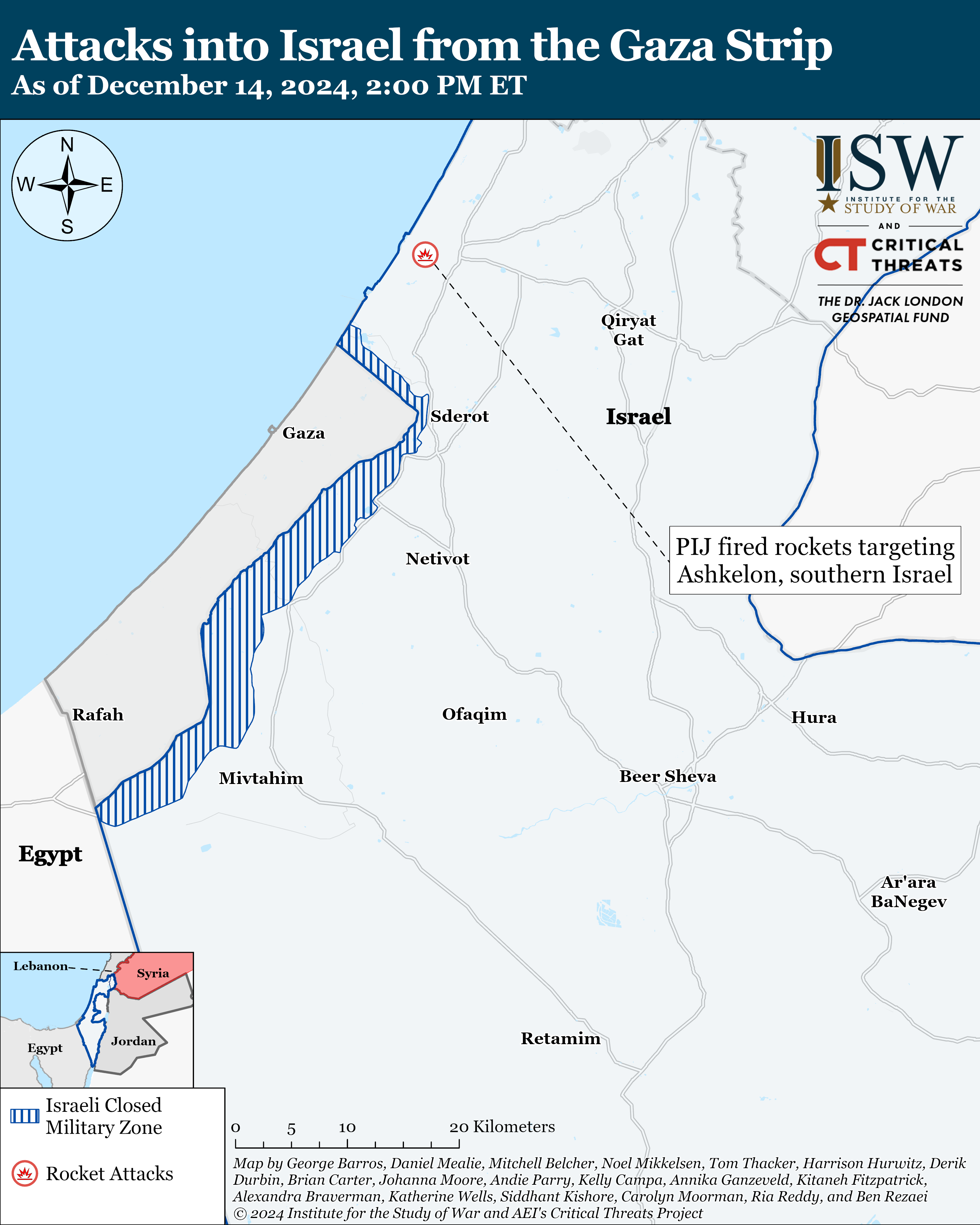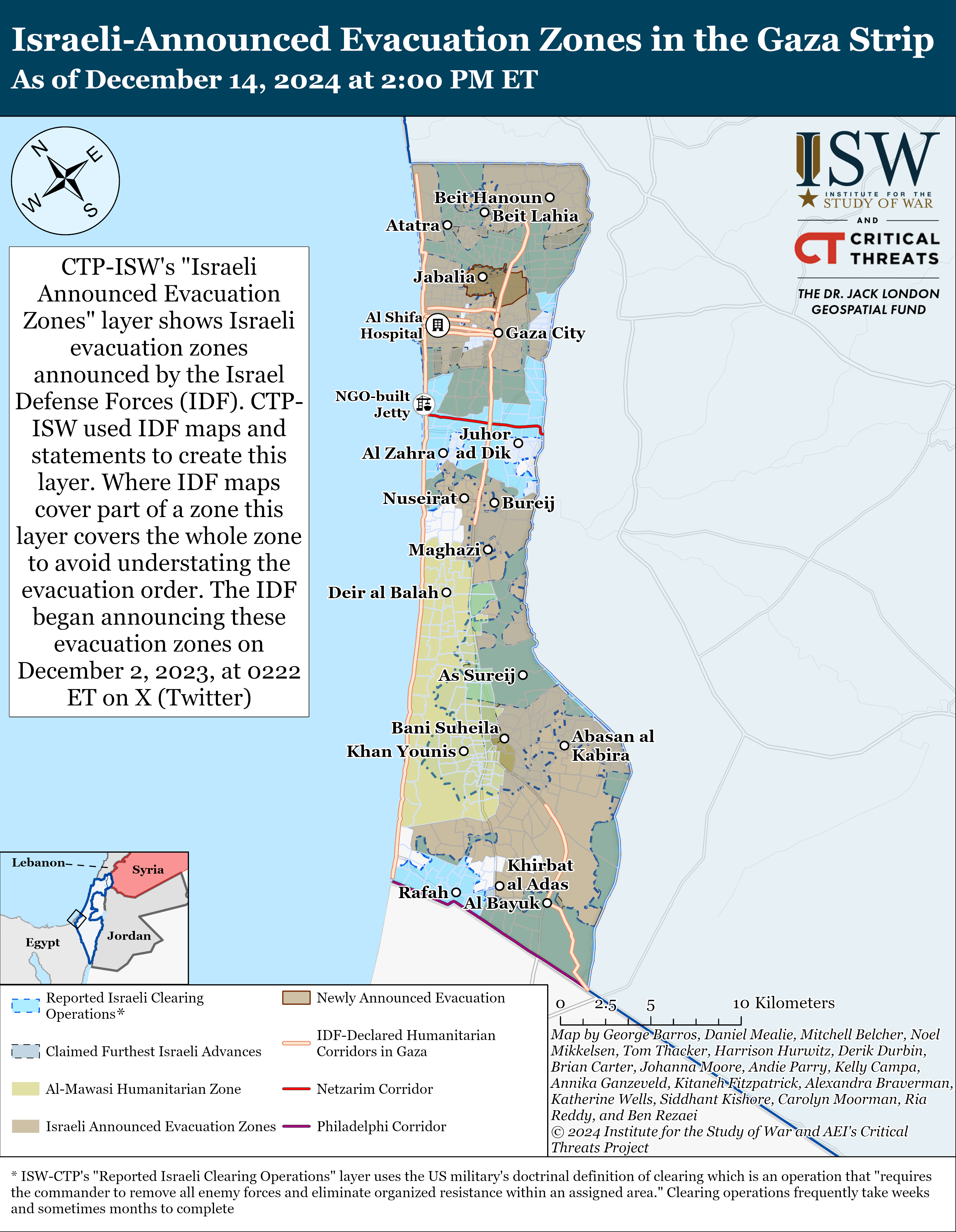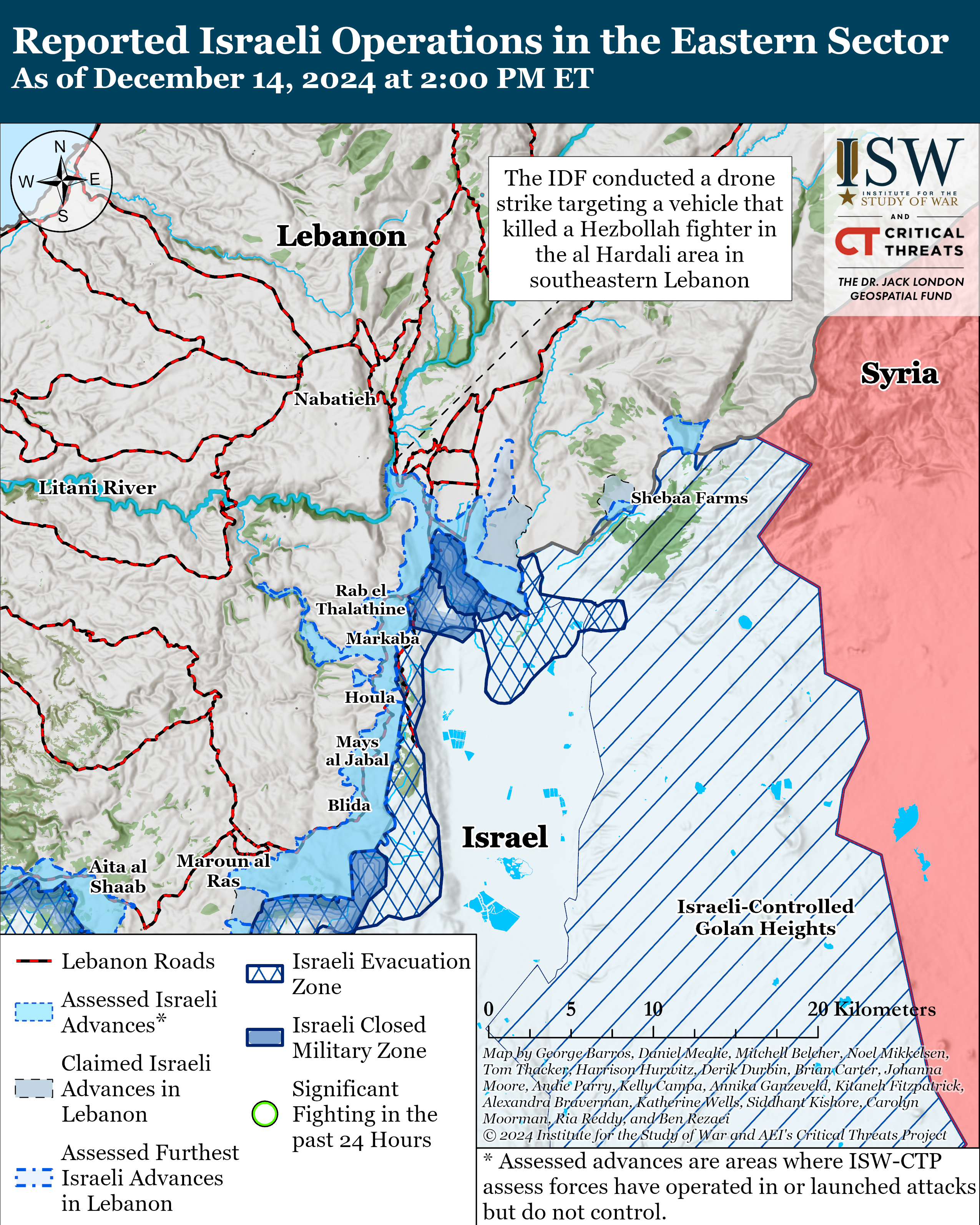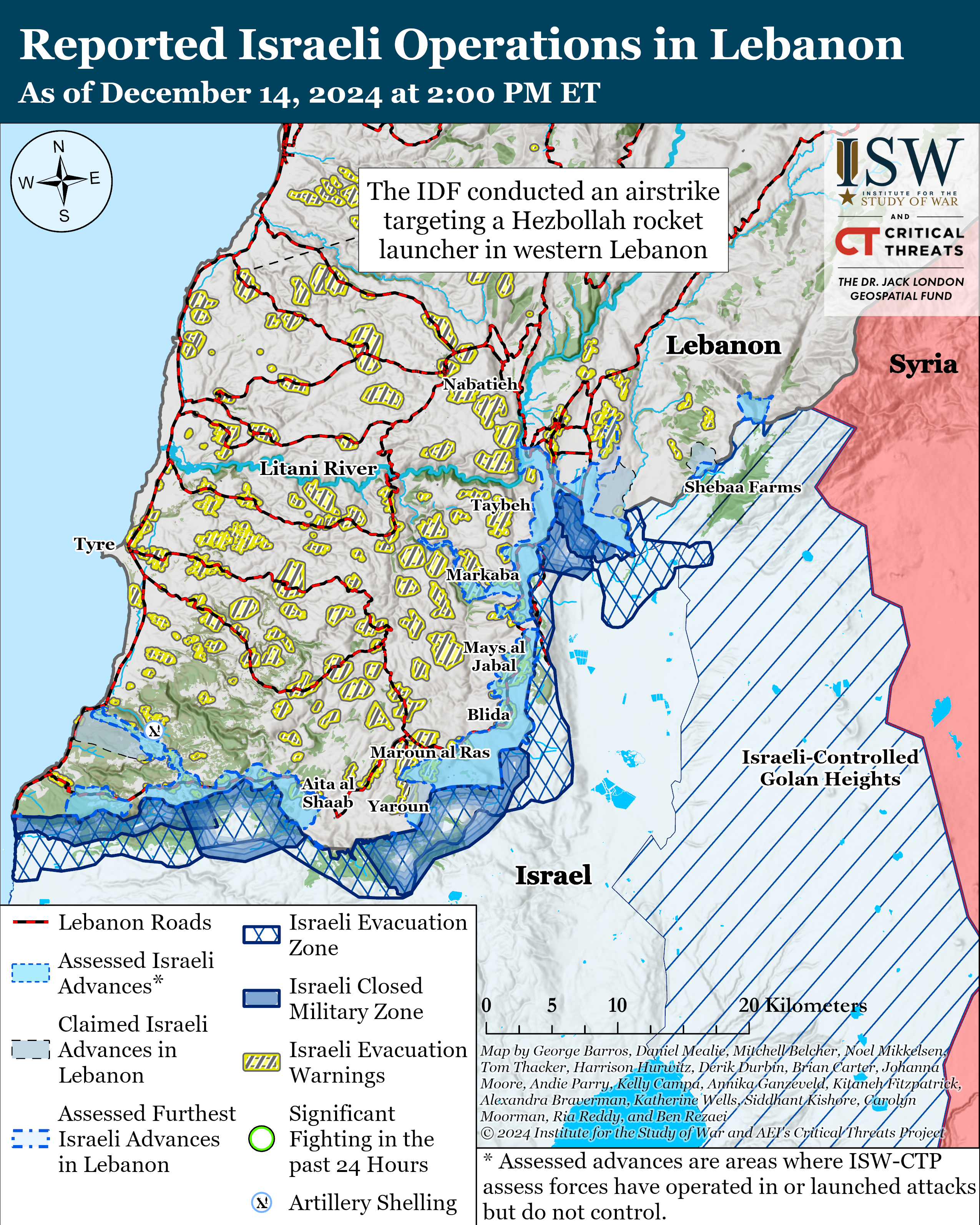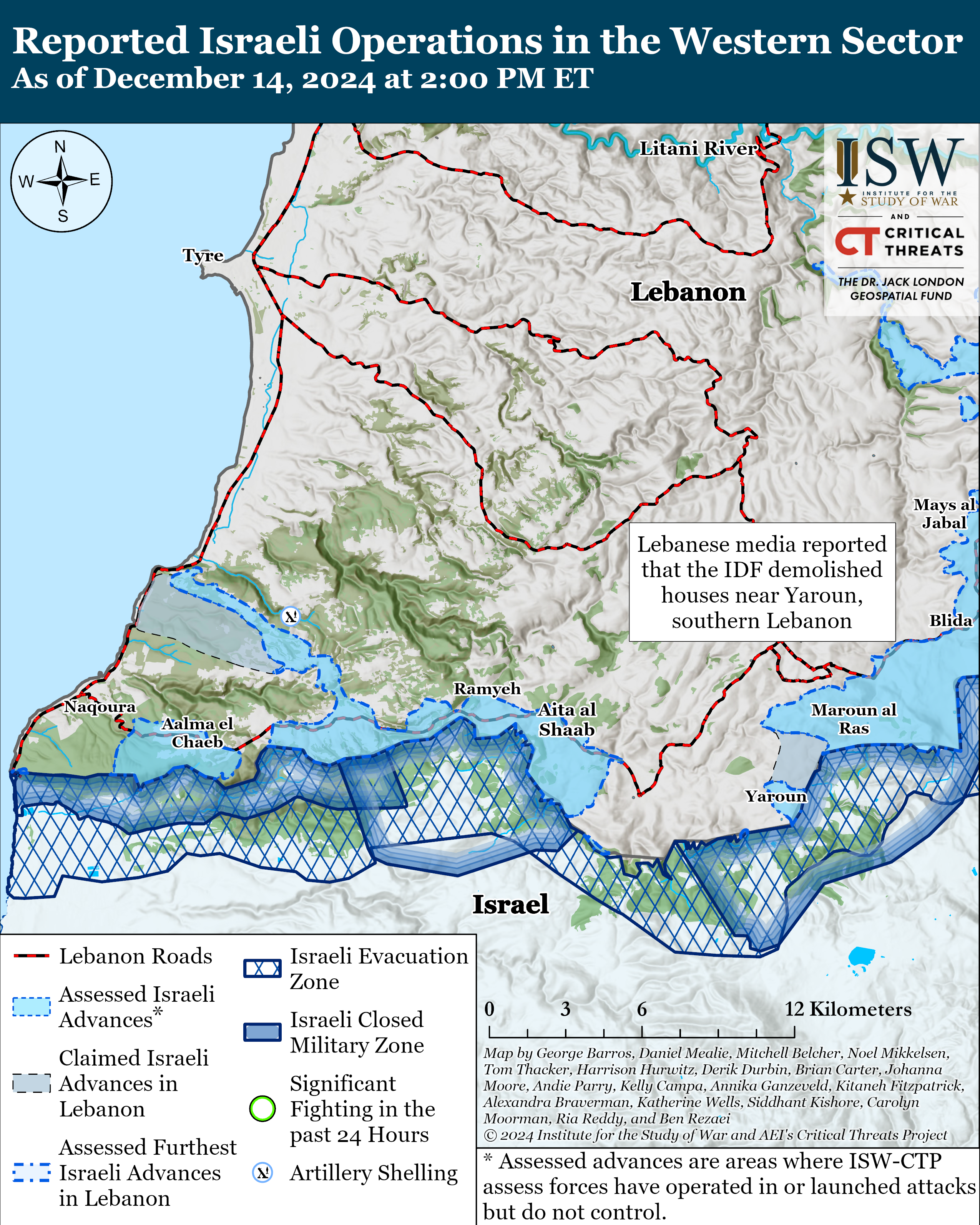{{currentView.title}}
December 14, 2024
Iran Update, December 14, 2024
Information Cutoff: 2:00 pm ET
The Critical Threats Project (CTP) at the American Enterprise Institute and the Institute for the Study of War (ISW) publish the Iran Update, which provides insights into Iranian and Iranian-sponsored activities that undermine regional stability and threaten US forces and interests.
Click here to see CTP and ISW’s interactive map of Israeli ground operations, and here to see CTP and ISW’s interactive map of the ongoing opposition offensive in Syria. These maps are updated daily alongside the static maps present in this report.
We do not report in detail on war crimes because these activities are well-covered in Western media and do not directly affect the military operations we are assessing and forecasting. We utterly condemn violations of the laws of armed conflict and the Geneva Conventions and crimes against humanity even though we do not describe them in these reports.
Hayat Tahrir al Sham (HTS) leader Abu Mohammed al Jolani is consolidating political and security power under HTS in a post-Assad Syrian government. HTS-led forces assumed control of Daraa City and the Nassib border crossing from the Southern Operations Room on December 14.[i] Jolani and Southern Operations Room leaders met on December 11 to discuss coordination in military and civil affairs.[ii] It is notable that these Syrian groups have agreed to cooperate with HTS despite historical animosity with HTS’s predecessor and al Qaeda affiliate Jabhat al Nusra in the mid-2010s.[iii]
Jolani has continued to integrate HTS allies into the interim Syrian Salvation Government, securing control over key civil and security services. Jolani met with Nour al Dink al Zink commander Ahmed Rizk on December 14 to discuss the role of “revolutionary cadres” in the future Syrian government and the restructuring of the Syrian Defense Ministry.[iv] Rizk and his group have long fought alongside HTS in northwestern Syria. Syrian media reported on December 10 that the HTS-controlled interim government also plans to reorganize the Syrian Arab Army (SAA).[v] Reorganization within the Syrian army and Syrian Defense Ministry supports reconciliation with former regime elements but also creates opportunities to appoint HTS loyalists and gain control over the government bureaucracy.
The HTS-led interim government appears to be pursuing legal recourse against former regime officials outside of a constitutionally-bound justice system. The interim Syrian Ministry of Information announced on December 13 that the HTS-led interim government will hold accountable former regime media officials who directly or indirectly supported crimes against the Syrian people.[vi] It is not clear if this process will be undertaken by the interim Justice Ministry or whether the entity that does prosecute former regime officials will use HTS’s Sunni Sharia law or a more secular legal code. HTS has used a ”hybrid civil-Islamic court structure” that uses HTS-approved Sunni Sharia law in the areas it controls in northwestern Syria.[vii] HTS has not defined judicial procedures it intends to use to prosecute former regime officials and could decide to use a secular justice system. HTS lacks the formal authority to prosecute regime officials, though it is necessary to hold former regime officials accountable for crimes committed against the Syrian people. That authority should rest with an international tribunal or a new Syrian government and a constitution that have yet to be established. Trials held under HTS’s Sunni Sharia style justice system could raise sectarian tensions regardless of legitimate charges or a fair trial.
Syrian Democratic Forces (SDF) Commander General Mazloum Abdi is attempting to preserve and unify the SDF’s Kurdish base as the group faces two existential threats in the wake of the fall of the Assad regime.[viii] Abdi argued that Kurdish unity was critical to address threats currently facing their community.[ix] Arab communities in Deir ez Zor and Raqqa have begun defecting from the SDF and calling for an end to SDF rule in Arab areas. The combination of these events threaten to unravel the fragile Kurdish-Arab coalition that the United States helped establish. Turkey is simultaneously threatening to destroy the SDF. Turkish Foreign Minister Hakan Fidan threatened on December 13 to “eliminate” the SDF, Kurdistan Workers Party (PKK), and People’s Defense Units (YPG).[x] Abdi added that unity and dialogue among the Kurds is critical for participating in the development of the new Syrian government. CTP-ISW assessed that Abdi intends to negotiate its role in a future Syrian government, likely to prevent further unrest within Arab populations and militias under the SDF.[xi]
HTS leader Abu Mohammed al Jolani stated on December 14 that Israel used Iran as a “pretext” to enter Syria but he added that HTS has “no intention of entering into conflict with Israel.”[xii] IDF Chief of Staff Herzi Halevi reiterated on December 14 that the IDF has no intention of interfering in Syrian domestic affairs or ”ruling” Syria.[xiii] Halevi added that the IDF is only operating in Syria to ensure the safety of Israel. An IDF company commander in the 603rd Combat Engineering Battalion (7th Armored Brigade) stated that the IDF advanced 10 kilometers into Syria. [xiv]
Some elements in Iran are either alarmed or trying to generate alarm over the status of the Sayyida Zeinab shrine in Syria. This alarm is not being reflected in the Syrian information space at this time. One Iranian media outlet published a video on December 13 allegedly showing an HTS member reciting a poem praising Umar ibn al Khattab, the Sunni second Caliph, at the Sayyidah Zainab shrine.[xv] The outlet stated that reading this poem is ”provocative” and aimed at ”boiling the blood” of Syrian Shia. Followers of Shia Islam believe that Umar is responsible for the death of Fatima, the mother of Zeinab. Approximately 720,000 users read this article, according to the outlet. The same Iranian outlet published an article on December 13 claiming that “takfiri terrorist groups“ in Syria are introducing new restrictions for Shiites to make pilgrimage the Sayyida Zeinab shrine and Sayyidah Ruqayya shrine in Damascus.[xvi] Iranian media has frequently used the term ”takfiri terrorists” to refer to HTS and ISIS, but it often conflates other Syrian opposition groups with salafi-jihadists. The prevalence of these reports in the information space could stoke sectarian tensions, particularly if the reports begin to gain traction in Arabic-language or Syrian media.
These alarmist reports in Iranian media are not being picked up in the Syrian information space at this time. One local Syrian man who regularly visits the Sayyida Zeinab shrine gave an interview to a Syria-focused analyst claiming that HTS is committed to protecting minority sites, including the Sayyidah Zeynab shrine.[xvii] The Syrian denied recent social media reports amplified in the Iranian media space that HTS entered the shrine violently and chanted provocative slogans, though he allowed that the chant of ”Allahu Akbar” was seen as provocative by some individuals within the Shia community.[xviii] CTP-ISW has not observed Syrian media reporting or recirculating reports of violence, provocation, or restriction at the Sayyida Zeinab shrine or the Sayyida Ruqayya shrine at this time.
The Iranian regime does not appear to have assumed a clear strategy for how to approach the HTS-led interim government in Syria, as exemplified by the contradicting reports regarding the safety of Shia holy sites following the fall of the Assad regime. Certain Iranian media outlets have amplified reports of HTS fighters interfering with the Sayyida Zeinab shrine and the Sayyidah Ruqayya shrine, while other Iranian media reports claimed that HTS engaged respectfully during a visit to the shrine in recent days.[xix] The fact that the Iranian media is not pursuing a clear messaging campaign about the Shia holy sites in Syria may indicate that the Iranian defense and political establishment has not yet decided how best to interact with the new HTS-led interim government. The rapid pace in which the Assad regime fell, resulting in the loss of billions of dollars for the Iranian regime, has almost certainly forced Iran to re-evaluate its strategy in regard to Syria and the region at large.[xx]
An Israeli Army Radio correspondent reported on December 14 that the Israel Defense Forces (IDF) struck at least 20 former Syrian Arab Army (SAA) targets across Syria.[xxi] The IDF struck former SAA communications sites and ”electronic warfare antennas“ in multiple locations including Damascus, Suwayda, Maysaf, Latakia, and Tartus. The journalist reported that the IDF targeted these sites to ensure the targets did not fall into the hands of ”hostile elements.” Syrian media reported that the IDF airstrikes in Damascus targeted warehouses near Mount Qasioun previously controlled by the Syrian Republican Guard and SAA 4th Division and the SAA‘s al Dumayr airbase in the Damascus countryside.[xxii]
The prospects for Russia's continued military presence in Syria remain unclear as reports that Russia is evacuating its military assets from Syria continue. Ukraine's Main Military Intelligence Directorate (GUR) stated on December 14 that "hundreds" of Russian soldiers cannot reach Hmeimim Air Base from Homs Governorate out of fear that Russian forces will come under fire from unspecified actors.[xxiii] The GUR stated that the Russian Ministry of Defense's (MoD) Africa Corps arrived in Syria to protect Russian forces moving towards Russia's bases on the western coast and that Russian Colonel Dmitry Motrenko is negotiating with military contingents in Syria from other unspecified states in order to secure guarantees of "immunity" for Russian soldiers waiting at the Tiyas Air Base west of Palmyra. The GUR also stated that roughly 1,000 Russian personnel left Damascus on December 13 in a column heading towards the Port of Tartus and Hmeimim Air Base, and ISW observed footage on December 13 of Russian military convoys moving from Damascus and other areas in southern Syria, likely towards the two main Russian bases.[xxiv] Reuters reported on December 14 that a "Syrian security official" stationed near Hmeimim Air Base stated that at least one cargo plane flew out of the base on December 14 bound for Libya.[xxv] Syrian military and security sources reportedly stated that Russia is withdrawing some heavy equipment and senior officers from the Syrian Arab Army (SAA) to Moscow but is currently not planning to permanently pull out of the Port of Tartus or Hmeimim Air Base. A Russian milblogger posted photos and footage on December 14 purportedly showing Russian military assets still operating at the Russian helicopter base at Qamishli in northeastern Syria, and a Russian source claimed on December 14 that Russian forces have withdrawn from their base in Kobani in northern Syria.[xxvi]
The complex nature of the interim Syrian government is likely resulting in conflicting reports about whether Russia is engaged in talks with Syrian opposition groups. Hayat Tahrir al Sham (HTS) controls the Syrian interim government, but HTS and the interim government do not yet have complete control over the disparate groups that helped overthrow the Assad regime. Russian Deputy Foreign Affairs Minister Mikhail Bogdanov stated on December 12 that Russia has established contacts with HTS.[xxvii] Reuters reported on December 14 that a Russian source stated that discussions between Russia and the interim Syrian government are ongoing.[xxviii] A "senior rebel official close to the new interim administration" told Reuters, however, that the issue of Russia's military presence in Syria and Russia's previous agreements with the Assad regime are "not under discussion" and that talks at an unspecified time in the future will address this matter. The official reportedly stated that the "Syrian people will have the final say." Kremlin newswire TASS reported on December 13 that Mohammed Sabra, a Syrian politician who represented the Syrian opposition's High Negotiations Committee at the 2016 Geneva peace talks on the Syrian Civil War, similarly stated that there should be a referendum in the future to allow the Syrian people to approve any foreign military presence in Syria.[xxix] It is unclear if Reuter's "senior rebel official close to the new interim administration" who denied talks between Russia and the interim government is a member of HTS or another Syrian opposition group.[xxx] It remains unclear if Russia is in contact with all the Syrian opposition groups necessary to guarantee the short- and long-term safety of its military bases and select opposition groups may be unaware that Russia is in discussion with other groups. Russian state media has notably not differentiated between different opposition groups when reporting on the situation in Syria, possibly as part of efforts to present the interim government as more united so as to increase the legitimacy of any agreements Russia reaches with one or some of the groups.[xxxi]
This is not an exhaustive list of all Russian bases in Syria. CTP-ISW will continue to update this map as more information becomes available about the status of Russian forces at Russian bases throughout Syria.
The international community has not yet established a plan for how to engage with the transitional government in Syria. The United States, UN, EU, Turkey, and various Arab states met in Jordan on December 14 to discuss supporting the political process in Syria.[xxxii] US Secretary of State Antony Blinken and the foreign ministers of Jordan, Egypt, Lebanon, Iraq and Saudi Arabia agreed on unspecified ”joint principles” for recognizing a future Syrian government.[xxxiii] Blinken stressed that the transition process must be ”Syrian-led.” Blinken stated that the US has engaged in “direct talks” with HTS.[xxxiv] The US designated HTS as a foreign terrorist organization in 2018.[xxxv] Blinken stressed that the United States communicated a set of ”governing principles” to HTS that includes ensuring human rights are upheld and the rejection of extremism.[xxxvi]
Lebanese Hezbollah Secretary General Naim Qassem is seeking to develop a working relationship with the HTS-led interim government in Damascus in order to restore Hezbollah’s weapons supply route in Syria.[xxxvii] HTS leader Abu Mohammed al Jolani is unlikely to develop any relationship with Hezbollah. Hezbollah supported the Assad regime by deploying thousands of fighters and helped seized key Syrian cities, such as Qusayr and Aleppo.[xxxviii] Qassem gave a televised speech on December 14 where he acknowledged that Hezbollah has lost its ground lines of communication (GLOC) from Iran through Syria and signaled his willingness to restore these GLOCs with the support of the new interim government in Syria.[xxxix] Qassem said that Hezbollah supported the Assad regime due to its “hostile position” against Israel and added that the interim government in Syria should also declare Israel its ”enemy.”[xl] HTS leader Jolani said that he has “no intention of entering into conflict with Israel.”[xli]
Key Takeaways:
- HTS Consolidates Power in Syria: Hayat Tahrir al Sham (HTS) leader Abu Mohammed al Jolani is consolidating political and security power under HTS in a post-Assad Syrian government. Jolani has continued to integrate HTS allies into the interim Syrian Salvation Government, securing control over key civil and security services. The HTS-led interim government also appears to be pursuing legal recourse against former regime officials outside of a constitutionally-bound justice system.
- Syrian Democratic Forces: Syrian Democratic Forces (SDF) Commander General Mazloum Abdi is attempting to preserve and unify the SDF’s Kurdish base as the group faces two existential threats in the wake of the fall of the Assad regime.
- Religious and Sectarian Tension in Syria: Some elements in Iran are either alarmed or trying to generate alarm over the status of the Sayyida Zeinab shrine in Syria. This alarm is not being reflected in the Syrian information space at this time. The Iranian regime does not appear to have assumed a clear strategy for how to approach the HTS-led interim government in Syria, as exemplified by the contradicting reports regarding the safety of Shia holy sites following the fall of the Assad regime.
- Israel in Syria: An Israeli Army Radio correspondent reported on December 14 that the Israel Defense Forces (IDF) struck at least 20 former Syrian Arab Army (SAA) targets across Syria. HTS leader Abu Mohammed al Jolani stated on December 14 that Israel used Iran as a “pretext” to enter Syria but he added that HTS has “no intention of entering into conflict with Israel.”
- Russia in Syria: The prospects for Russia's continued military presence in Syria remain unclear as reports that Russia is evacuating its military assets from Syria continue. Ukraine's Main Military Intelligence Directorate (GUR) stated on December 14 that "hundreds" of Russian soldiers cannot reach Hmeimim Air Base from Homs Governorate out of fear that Russian forces will come under fire from unspecified actors.
- Hezbollah in Syria: Lebanese Hezbollah Secretary General Naim Qassem is seeking to develop a working relationship with the HTS-led interim government in Damascus in order to restore Hezbollah’s weapons supply route in Syria.
Gaza Strip:
Axis of Resistance objectives:
- Erode the will of the Israeli political establishment and public to sustain clearing operations in the Gaza Strip
- Reestablish Hamas as the governing authority in the Gaza Strip
The IDF 162nd Division continued clearing ops in the northern Gaza Strip on December 14. Commercially available satellite imagery captured on December 14 shows that the IDF expanded its clearing operations on the outskirts of Beit Lahia and in areas within the Jabalia refugee camp. The IDF has killed approximately 2,000 Palestinian militia fighters and detained 1,500 others since it began clearing operations in Jabalia in early October 2024, according to an Israeli Army Radio correspondent.[xlii] Palestinian militias have killed 35 Israeli soldiers in Jabalia during this time.[xliii]
The IDF conducted an airstrike targeting a Palestinian militia cell in Gaza City on December 13.[xliv] The IDF said that the Palestinian militia cell was operating out of a school complex in Gaza City.[xlv] The militia cell was planning on conducting terrorist attacks targeting Israeli forces in the Gaza Strip and inside the Israeli territory in the “immediate future,” according to the IDF.[xlvi] The IDF said that it took steps to reduce civilian casualties before the airstrike.[xlvii]
The Palestinian Mujahedeen Movement fired rockets targeting Israeli soldiers near Gaza City on December 14.[xlviii]
The IDF conducted an airstrike targeting a municipality building in Deir al Balah in the central Gaza Strip and killed senior Hamas member Diab Ali al Jaru on December 14.[xlix] Jaru served as the chairman of the Hamas-run administrative committee in the central Gaza Strip and was the mayor of Deir al Balah.[l] The IDF stated that Jaru was also a part of Hamas’ military wing and assisted Hamas fighters in attacking Israeli forces in the central Gaza Strip.[li] The IDF said that it used precision weapons and additional intelligence to reduce civilian casualties before the airstrike.[lii] Palestinian medical personnel claimed that the airstrike killed ten Gazans, however.[liii]
The Palestinian Islamic Jihad (PIJ) fired rockets targeting Ashkelon, southern Israel on December 13.[liv] The IDF intercepted two rockets fired from the central Gaza Strip.[lv] The IDF conducted retaliatory airstrikes targeting the launch site and destroyed it.[lvi] The IDF located PIJ rocket launchers 50 meters away from a humanitarian aid storage facility. The airstrikes also killed an unspecified number of Palestinian militia fighters, according to the IDF. The IDF issued an evacuation order for areas northeast of Jabalia in the northern Gaza Strip before conducting the airstrikes.[lvii] The order requested Gazans to immediately evacuate to the IDF-designated humanitarian zone in Gaza City.[lviii] The IDF separately detected an unspecified projectile launched from the central Gaza Strip on December 14 that fell in an open area in southern Israel.[lix]
US Central Command (CENTCOM) Commander General Michael Kurilla discussed the region with the IDF Chief of Staff Herzi Halevi in Israel on December 13.[lx] Kurilla and Halevi discussed regional threats and the ongoing developments in Syria.[lxi] Both sides emphasized joint readiness against emerging threats in the region.[lxii] The CENTCOM readout stated that Kurilla also met with Israeli Defense Minister Israel Katz and the commanders of the IDF Northern Command, and the IDF Air Force, during his visit to Israel.[lxiii]
West Bank
Axis of Resistance objectives:
- Establish the West Bank as a viable front against Israel
Palestinian Authority (PA) security forces launched a counterterrorism operation in the northern West Bank on December 14 in response to increased Palestinian militia attacks targeting PA infrastructure.[lxiv] The PA-led operation is likely designed to dismantle Palestinian militia infrastructure in the northern West Bank and restore at least a modicum of PA control there.[lxv] PA security forces operated in the Jenin refugee camp and ”took control” of two unspecified areas in the camp.[lxvi] PA security forces also isolated two hospitals in the camp.[lxvii] PIJ fighters responded by detonating five improvised explosive devices (IED) targeting PA security forces in Jenin refugee camp. PIJ also called upon Palestinians in the West Bank to demonstrate against the PA operations in the West Bank.[lxviii] PA security forces also engaged unspecified Palestinian militias in the Tulkarm refugee camp.[lxix]
Northern Israel and Lebanon
Lebanese Hezbollah objectives:
- End Israeli operations in the Gaza Strip
- Survive the October 7 War as a capable political and military organization with control over Lebanon
The IDF conducted a drone strike targeting a vehicle that killed a Hezbollah fighter in the al Hardali area in southeastern Lebanon, on December 14.[lxx]
The IDF Air Force conducted a strike on December 14 targeting a loaded Hezbollah rocket launcher in southern Lebanon aimed at Israeli territory.[lxxi] Geolocated footage posted on December 14 showed the IDF conducting an airstrike near Snaiber, south of Tyre, in western Lebanon.[lxxii] The IDF reiterated its commitment to the Israel-Lebanon ceasefire. Hezbollah has not claimed an attack on Israel since December 2.[lxxiii]
Lebanese media reported on December 14 that the IDF demolished houses near Yaroun, southern Lebanon.[lxxiv] The IDF is permitted to operate in southern Lebanon until the end of January 2025, according to the Israel-Lebanon ceasefire.[lxxv]
Iran and the Axis of Resistance
The Iran Update provides insights into Iranian and Iranian-sponsored activities abroad that undermine regional stability and threaten US forces and interests. It also covers events and trends that affect the stability and decision-making of the Iranian regime. The Critical Threats Project (CTP) at the American Enterprise Institute and the Institute for the Study of War (ISW) provides these updates regularly based on regional events.
CTP-ISW defines the “Axis of Resistance” as the unconventional alliance that Iran has cultivated in the Middle East since the Islamic Republic came to power in 1979. This transnational coalition is comprised of state, semi-state, and non-state actors that cooperate to secure their collective interests. Tehran considers itself to be both part of the alliance and its leader. Iran furnishes these groups with varying levels of financial, military, and political support in exchange for some degree of influence or control over their actions. Some are traditional proxies that are highly responsive to Iranian direction, while others are partners over which Iran exerts more limited influence. Members of the Axis of Resistance are united by their grand strategic objectives, which include eroding and eventually expelling American influence from the Middle East, destroying the Israeli state, or both. Pursuing these objectives and supporting the Axis of Resistance to those ends have become cornerstones of Iranian regional strategy.
[i] https://x.com/Daraa24_24/status/1867943436919144865
[ii] https://t.me/damascusv011/26063
[iii] https://www.bbc.com/news/articles/ckg9z3r2xp9o https://x.com/Daraa24_24/status/1866853326253375549 https://www.enabbaladi dot net/637198/%D9%85%D9%86-%D8%B9%D9%84%D9%8A-%D8%A8%D8%A7%D8%B4-%D8%B0%D8%B1%D8%A7%D8%B9-%D8%A3%D8%AD%D9%85%D8%AF-%D8%A7%D9%84%D8%B9%D9%88%D8%AF%D8%A9-%D8%A7%D9%84%D9%86%D8%A7%D8%AC%D9%8A-%D9%85%D9%86-%D9%85/
[iv] https://thiqa-agency dot com/%d8%a7%d9%84%d8%b4%d8%b1%d8%b9-%d9%8a%d8%b3%d8%aa%d9%82%d8%a8%d9%84-%d8%a7%d9%84%d9%82%d8%a7%d8%a6%d8%af-%d8%a7%d9%84%d8%b9%d8%b3%d9%83%d8%b1%d9%8a-%d8%a3%d8%ad%d9%85%d8%af-%d8%b1%d8%b2%d9%82-%d9%81/
[v] https://x.com/Daraa24_24/status/1866460224275558812
[vi] https://t.me/AgencyNewsSham/36356
[vii] https://www.cnn.com/2024/12/13/middleeast/can-islamist-rebels-govern-syria-intl/index.html
[viii] https://x.com/MazloumAbdi/status/1867985022298587527
[ix] https://x.com/MazloumAbdi/status/1867985022298587527
[x] https://www.understandingwar.org/backgrounder/iran-update-december-13-2024
[xi] https://www.understandingwar.org/backgrounder/iran-update-december-13-2024
[xii] https://x.com/GLZRadio/status/1867945132164616530 ; https://t.me/damascusv011/26283 ; https://x.com/HalabTodayTV/status/1867942431959683239
[xiii] https://x.com/GLZRadio/status/1867983938611794182
[xiv] https://www.jpost dot com/israel-news/article-833330
[xv] https://www.tabnak dot ir/fa/news/1277553
[xvi] https://www.tabnak dot ir/fa/news/1277573
[xvii] https://www.aymennaltamimi.com/p/the-sayyida-zaynab-shrine-and-shia
[xviii] https://t.me/Al_Nojaba/1225; https://x.com/jamejamCPI/status/1866836711738921140 ; https://x.com/EngineerYM87/status/1866875439131623468
[xix] https://defapress dot ir/fa/news/712548 ; https://www.mehrnews dot com/news/6313786; https://defapress dot ir/fa/news/712548 ; https://www.nytimes.com/2024/12/07/world/middleeast/iran-syria-rebels.html ; https://www.khabaronline dot ir/news/1995693 ; https://understandingwar.org/backgrounder/iran-update-december-13-2024
[xx] https://www.timesofisrael dot com/in-video-appeal-to-iranian-citizens-netanyahu-says-one-day-iran-will-be-free/
[xxi] https://x.com/Doron_Kadosh/status/1867829970539540622
[xxii] https://t.me/damascusv011/26262 ; https://t.me/damascusv011/26264
[xxiii] https://t.me/DIUkraine/5022
[xxiv] https://isw.pub/UkrWar121324; https://t.me/DIUkraine/5022
[xxv] https://www.reuters.com/world/russia-pulling-back-not-out-syria-sources-say-2024-12-14/
[xxvi] https://t.me/milinfolive/137538; https://t.me/motopatriot/30485; https://t.me/novosti_efir/63419
[xxvii] https://isw.pub/UkrWar121224
[xxviii] https://www.reuters.com/world/russia-pulling-back-not-out-syria-sources-say-2024-12-14/
[xxix] https://tass dot ru/mezhdunarodnaya-panorama/22659293
[xxx] https://isw.pub/UkrWar121224
[xxxi] https://t.me/tass_agency/290865 ; https://t.me/tass_agency/290737 ; https://t.me/tass_agency/290354; https://t.me/tass_agency/290355; https://t.me/tass_agency/290356; https://t.me/tass_agency/290357; https://t.me/tass_agency/290358; https://t.me/tass_agency/290360; https://t.me/tass_agency/290363 ; https://t.me/tass_agency/290367; https://t.me/tass_agency/290369 ; https://tass dot ru/mezhdunarodnaya-panorama/22612661
[xxxii] https://www.reuters.com/world/middle-east/us-regional-diplomats-meet-discuss-syrias-future-2024-12-14/
[xxxiii] https://www.axios.com/2024/12/14/blinken-us-contact-with-syria-rebels-hts
[xxxiv] https://www.nytimes.com/2024/12/14/world/middleeast/blinken-jordan-syria-transition.html ; https://www.axios.com/2024/12/14/blinken-us-contact-with-syria-rebels-hts
[xxxv] https://www.dni.gov/nctc/ftos/hts_fto.html
[xxxvi] https://www.nytimes.com/2024/12/14/world/middleeast/blinken-jordan-syria-transition.html
[xxxvii] https://www.almanar dot com.lb/12911978
[xxxviii] https://english.alarabiya dot net/News/middle-east/2024/12/07/source-close-to-hezbollah-says-group-sent-2-000-fighters-to-syria-
[xxxix] https://www.almanar dot com.lb/12911978
[xl] https://www.almanar dot com.lb/12911978
[xli] https://x.com/HalabTodayTV/status/1867942431959683239
[xlii] https://t.me/moriahdoron/17504 ; https://www.understandingwar.org/backgrounder/iran-update-october-6-2024
[xliii] https://t.me/moriahdoron/17504
[xliv] https://x.com/idfonline/status/1867743923331834325 ; https://x.com/idfonline/status/1867743926033297435
[xlv] https://x.com/idfonline/status/1867743926033297435
[xlvi] https://x.com/idfonline/status/1867743923331834325
[xlvii] https://x.com/idfonline/status/1867743926033297435
[xlviii] https://t.me/darebmojahden/5412
[xlix] https://x.com/idfonline/status/1867949150693642700 ; https://www.reuters.com/world/middle-east/seven-killed-israeli-strike-gaza-school-palestinian-emergency-service-says-2024-12-14/ ; https://x.com/idfonline/status/1867949162014367918
[l] https://www.reuters.com/world/middle-east/seven-killed-israeli-strike-gaza-school-palestinian-emergency-service-says-2024-12-14/ ; https://x.com/idfonline/status/1867949162014367918
[li] https://x.com/idfonline/status/1867949153483100390
[lii] https://x.com/idfonline/status/1867949162014367918
[liii] https://www.reuters.com/world/middle-east/seven-killed-israeli-strike-gaza-school-palestinian-emergency-service-says-2024-12-14/
[liv] https://t.me/sarayaps/18928
[lv] https://x.com/idfonline/status/1867647796406628369
[lvi] https://x.com/idfonline/status/1867887502264295747
[lvii] https://x.com/idfonline/status/1867887508954222934 ; https://x.com/AvichayAdraee/status/1867676808331899333
[lviii] https://x.com/AvichayAdraee/status/1867676808331899333
[lix] https://x.com/idfonline/status/1867970470961958979
[lx] https://x.com/CENTCOM/status/1867762009086808432 ; https://x.com/idfonline/status/1867956533365219549
[lxi] https://x.com/idfonline/status/1867956537697952108 ; https://x.com/centcom/status/1867762009086808432?s=46&t=vAB6sPPgAElLnZFQUkyKmg
[lxii] https://x.com/idfonline/status/1867956537697952108 ; https://x.com/centcom/status/1867762009086808432?s=46&t=vAB6sPPgAElLnZFQUkyKmg
[lxiii] https://x.com/centcom/status/1867762009086808432?s=46&t=vAB6sPPgAElLnZFQUkyKmg
[lxiv] https://x.com/GLZRadio/status/1867863656827892007 ; https://x.com/GLZRadio/status/1867937404759466273 ; https://t.me/moriahdoron/17505
[lxv] ttps://t.me/moriahdoron/17505
[lxvi] https://x.com/GLZRadio/status/1867863656827892007 ; https://t.me/sarayaps/18929
[lxvii] https://x.com/GLZRadio/status/1867863656827892007
[lxviii] https://t.me/sarayajneen/1912
[lxix] https://x.com/GLZRadio/status/1867937404759466273
[lxx] https://x.com/GLZRadio/status/1867894350967140525 ; https://x.com/Me1Ray/status/1867902769522413993
[lxxi] https://x.com/idfonline/status/1867868149791785300
[lxxii] https://x.com/Me1Ray/status/1867888872652513432 ;
[lxxiii] https://t.me/mmirleb/9639
[lxxiv] https://x.com/AlakhbarNews/status/1867935653675065473
[lxxv] https://www.timesofisrael dot com/full-text-the-israel-hezbollah-ceasefire-deal/

